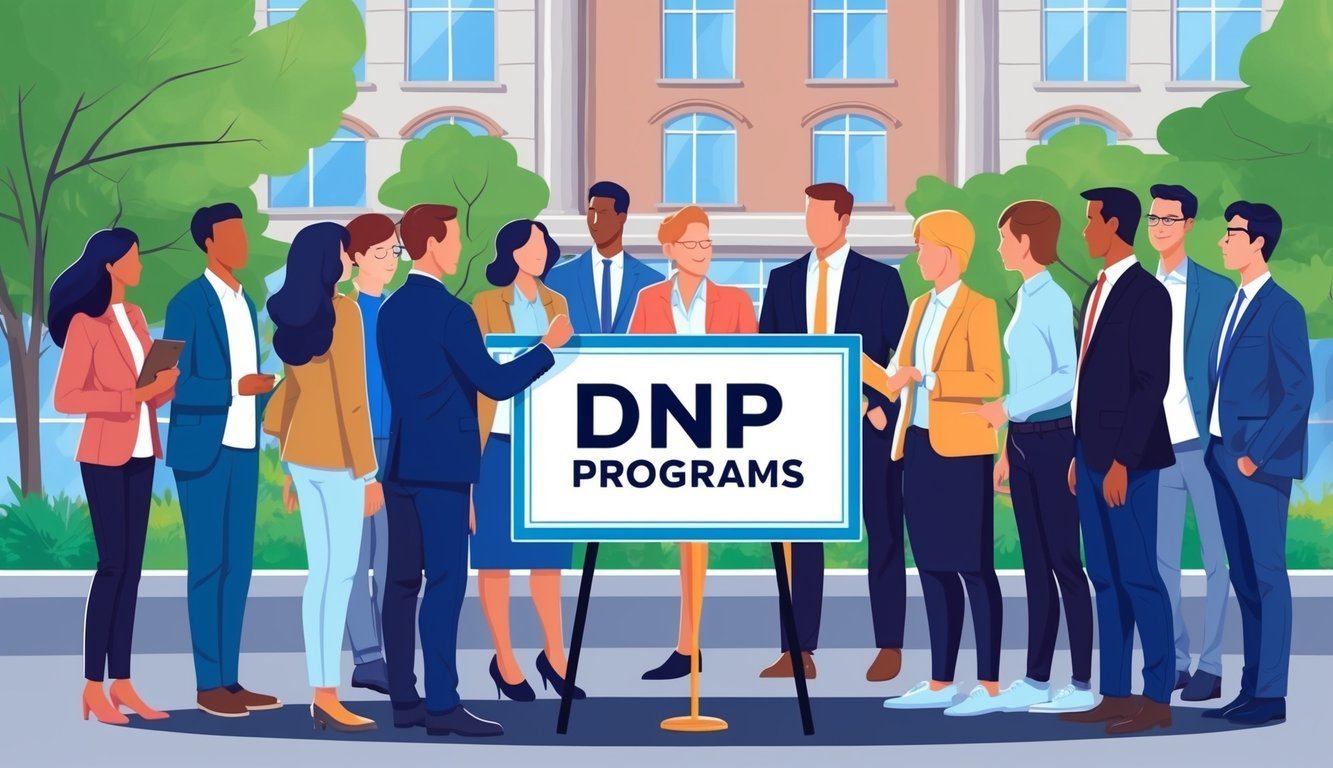Looking to advance your nursing career? Exploring Doctor of Nursing Practice (DNP) programs nearby can be a significant step towards achieving your professional goals. DNP programs are designed to elevate your nursing practice, enhance patient outcomes, and prepare you for leadership roles in healthcare. Whether you’re seeking to improve your skills in evidence-based practice or specialize in a particular area, finding the right DNP program near you will open doors to new possibilities in your career.
Understanding the role of Advanced Practice Registered Nurses (APRNs) within these programs is essential.
DNP graduates often take on leadership roles that influence patient care and healthcare policy.
The curriculum of these programs focuses on practical application, offering a blend of advanced clinical education and the skills needed to innovate in the nursing field.
As you search for DNP programs, consider factors like curriculum specialization, admission requirements, and career advancement opportunities.
The right program can significantly impact your nursing journey and help you become a leader in improving healthcare delivery.
Key Takeaways
- DNP programs enhance your skills and patient outcomes.
- Graduates often lead in improving healthcare practices.
- Choosing the right program is crucial for your career advancement.
Exploring DNP Programs
When considering DNP programs near you, it’s essential to explore your options thoroughly.
Look for programs that fit your needs, whether you prefer online DNP programs or traditional formats.
Program Types
| Program Type | Description |
|---|---|
| BSN to DNP | For registered nurses with a Bachelor of Science in Nursing, allowing a direct path to the DNP. |
| MSN to DNP | Designed for those with a Master of Science in Nursing seeking advanced practice. |
Accreditation
Make sure that the DNP programs you’re interested in are CCNE accredited.
This certification indicates high-quality education and can enhance your resume.
You can check accreditation status through the AACN.
Financial Considerations
Look into in-state tuition rates if you are considering public universities.
In-state programs often offer significant savings compared to out-of-state options.
Program Length
Most DNP programs take between 2 to 4 years to complete.
Your schedule and the program format will influence this duration.
Role and Scope of Practice

In the field of advanced practice nursing, various roles offer unique responsibilities and scopes of practice.
These roles ensure a wide range of healthcare needs are met, providing vital services to patients in different settings.
Nurse Practitioner
As a Nurse Practitioner (NP), you have the authority to diagnose and treat medical conditions.
NPs can specialize in areas such as family medicine, pediatrics, and geriatrics.
This role involves:
- Conducting comprehensive health assessments
- Ordering and interpreting diagnostic tests
- Developing treatment plans
- Prescribing medications within your state’s legal framework
In many states, NPs can work independently without physician supervision.
For example, an Acute Care Nurse Practitioner may focus on patients with acute illnesses, while a Family Nurse Practitioner provides holistic care for all ages.
You play a critical role in improving patient access to care, particularly in underserved areas.
For more on NP roles, visit Nurse Practitioner Practice Authority.
Clinical Nurse Specialist
As a Clinical Nurse Specialist (CNS), you provide expert guidance in specific clinical areas such as cardiology or oncology.
Your responsibilities include:
- Acting as a consultant for nursing staff
- Designing and implementing evidence-based practices
- Educating staff and patients on health management
CNSs focus on improving patient outcomes by enhancing care quality and efficiency.
You also engage in research to develop best practices, ultimately shaping standards in patient care.
Your expertise enhances the overall effectiveness of healthcare teams and supports patient-centered care.
Nurse Anesthetist
In the role of a Nurse Anesthetist, your primary responsibility is to administer anesthesia and manage patient care before, during, and after surgical procedures.
Key duties include:
- Conducting pre-anesthetic assessments
- Preparing and administering anesthesia agents
- Monitoring patients during surgery
You must be skilled in recognizing and addressing complications.
This role demands advanced knowledge of pharmacology and patient physiology.
Many Nurse Anesthetists also provide pain management services, contributing to both surgical and non-surgical patient care scenarios.
Nurse Midwife
As a Nurse Midwife, you specialize in providing care to pregnant individuals and their newborns.
Your role encompasses:
- Conducting prenatal, intrapartum, and postpartum care
- Managing normal labor and delivery
- Offering family planning services
You play a vital role in educating expectant parents about childbirth, breastfeeding, and infant care.
Nurse Midwives often work in hospitals, birthing centers, or community health settings.
Your focus on holistic care fosters nurturing relationships with families during a significant time in their lives.
Building Nursing Leadership
Effective nursing leadership is essential in today’s healthcare environment.
It includes various roles such as healthcare leadership, nursing administration, educational leadership, and advanced practice leadership.
Each area plays a crucial role in shaping policies, ensuring quality care, and fostering safe environments.
Healthcare Leadership
Healthcare leadership involves guiding teams to improve patient outcomes and drive health policy changes.
As a leader, you must focus on creating a culture of safety and quality.
Skills in communication, strategic planning, and conflict resolution are vital.
You will often collaborate with other health professionals to implement innovative solutions.
Engaging staff members through various initiatives can boost morale and improve service delivery.
Continuous education on current health policies is also necessary to navigate challenges effectively.
Nursing Administration
Nursing administration is key to managing healthcare organizations efficiently.
This involves overseeing nursing staff, budgeting, and adhering to regulations.
You need strong managerial skills to lead your team effectively.
Nurse administrators also shape health policy, advocating for resource allocation and organizational changes.
Understanding financial aspects can enhance your ability to support nursing programs.
Prioritizing staff development and mentorship helps foster a positive work environment.
Educational Leadership
As an educational leader, you will influence the next generation of nurses.
This role involves creating curricula that align with current health trends and practices.
You need to ensure that nursing programs not only provide theoretical knowledge but also emphasize practical skills.
Collaboration with other educational institutions is vital to maintain high standards in nursing education.
Encouraging research and evidence-based practice will help you develop a more competent workforce.
Supportive leadership promotes student and faculty success.
Advanced Practice Leadership
Advanced practice leadership focuses on improving patient care through specialized nursing roles.
Nurse practitioners, clinical nurse specialists, and nurse anesthetists all play a part in this arena.
You will need extensive knowledge in both clinical practice and leadership.
In this role, your influence extends beyond direct patient care.
You will participate in health policy discussions and advocate for nursing practices.
This includes ensuring that quality and safety standards are met.
Your ability to shape health outcomes is instrumental in advancing the nursing profession.
Curriculum and Specialization

In a Doctor of Nursing Practice (DNP) program, the curriculum and specialization options are designed to equip you with advanced skills necessary for leadership roles in healthcare.
The program generally includes a blend of online coursework, clinical experience, and various specialty tracks tailored to your career goals.
Online Coursework
Online coursework forms a significant part of DNP programs.
You will often encounter subjects like Nursing Informatics, Population Health, and Healthcare Systems.
These courses can be delivered through interactive platforms that encourage engagement with peers and faculty.
You might engage in discussions around Evidence-Based Health Policy, which is crucial for influencing healthcare practices.
The flexibility of online learning allows you to balance your studies with professional responsibilities, making it easier to manage your time effectively.
Many programs also offer asynchronous classes, where you can learn at your own pace while meeting deadlines.
Clinical Experience
Clinical experience is essential for applying what you learn in the classroom to real-world scenarios.
Most DNP programs require students to complete a specific number of clinical hours.
During these hours, you’ll work with various patient populations, which enhances your skills in areas such as Adult-Gerontology Acute Care or Psychiatric-Mental Health Nurse Practitioner roles.
This hands-on approach not only builds your confidence as a healthcare provider but also allows you to network with professionals in your field.
Your clinical experience will often culminate in a capstone project that showcases your ability to integrate theory with practice.
Specialty Tracks
DNP programs often offer various specialty tracks to align with your career aspirations.
Among these, you might find tracks such as Psychiatric-Mental Health and Adult-Gerontology, which prepare you for specific patient care needs.
The ability to choose a track enables you to focus on areas of personal interest and professional growth.
For example, if you’re passionate about leadership, a track in Healthcare Leadership may be available.
These specialty tracks generally help you develop targeted skills and knowledge, making you more competitive in the healthcare job market.
Career Advancement and Outlook

Pursuing a Doctor of Nursing Practice (DNP) can greatly enhance your career goals.
It prepares you for leadership roles in various healthcare settings.
You will gain the skills necessary for advanced practice and administration.
Career Outlook for DNPs
The demand for DNP professionals is steadily increasing.
Healthcare organizations prefer candidates with advanced degrees for leadership positions.
Here’s an overview of potential roles you might explore:
| Role | Average Salary |
|---|---|
| Nurse Executive | $110,000 – $150,000 |
| Clinical Nurse Specialist | $90,000 – $120,000 |
| Nurse Educator | $80,000 – $100,000 |
As a DNP graduate, you can expect to take on strategic roles that involve improving patient care and influencing healthcare policies.
Opportunities in Healthcare Organizations
Most healthcare organizations seek DNP graduates for their expertise.
You can work in various settings, including hospitals, clinics, and academic institutions.
DNPs often lead initiatives focused on quality improvement and patient safety.
An advanced nursing degree like the DNP can open doors to high-level roles.
It positions you as a leader who can make impactful changes within the healthcare system.
Your skills can directly benefit patient outcomes and organizational efficiency.
For more information on DNP programs, visit Nurse.org.
Application and Admission

When applying to a Doctor of Nursing Practice (DNP) program, you need to understand the entrance requirements and the support services available to you.
This information will help streamline your application process and ensure you meet all necessary criteria.
Entrance Requirements
To qualify for a DNP program, you typically need to have a valid RN license.
Many programs, including those at Chamberlain University, do not require GRE or MAT scores for admission, which simplifies the process.
Common requirements include:
- Bachelor’s Degree in Nursing: An accredited degree is often necessary.
- Transcripts: Provide official transcripts from all institutions attended.
- Professional Experience: Most programs prefer candidates with relevant nursing experience.
Some programs also offer distance learning options that allow you to complete your degree online.
This flexibility is ideal for working nurses seeking advancement without disrupting their careers.
Support Services
Many DNP programs provide valuable support services that can enhance your learning experience.
For example, clinical placement support is often available to help you secure the required clinical hours for graduation.
Support services may include:
- 24/7 Access to Resources: Online programs often provide constant access to coursework and materials.
- Dedicated Advisors: These professionals assist you throughout your educational journey.
- Clinical Placement Assistance: Programs like those at Chamberlain University help connect you with suitable clinical sites.
Using these resources can greatly enhance your experience and success in the DNP program, making your transition into advanced nursing roles more seamless.
Frequently Asked Questions

This section addresses common questions about DNP programs.
You will find specific information on the top-rated programs, duration, and salary expectations, as well as details about online options in Texas.
What are the top-rated DNP programs in Texas?
Some of the top-rated DNP programs in Texas include:
| University | Program Type |
|---|---|
| Texas Tech University | BSN to DNP |
| University of Texas at Austin | MSN to DNP |
| Baylor University | MSN to DNP |
| Texas A&M University | BSN to DNP |
| University of Houston | Post-Master’s DNP |
These programs are known for their quality of education and clinical practice opportunities.
How long does it generally take to complete a DNP program?
The time to complete a DNP program varies based on your previous education.
- For those with a BSN: Typically, it takes about 3 to 5 years.
- For those with an MSN: Most can complete it in 1 to 2 years.
Part-time options may lengthen the duration.
Can graduates of DNP programs use the title ‘Doctor’?
Yes, graduates from DNP programs can use the title “Doctor.” However, it is important to clarify that this title is in the context of academic and clinical practice, not to be confused with a medical doctor (MD).
What is the average salary for someone with a DNP degree?
The average salary for individuals with a DNP degree can vary widely based on specialty and location.
In Texas, advanced practice registered nurses with a DNP degree earn an average of approximately $129,480 per year.
This is significantly higher than the average salary of RNs, which is around $86,070.
Are there any fully online DNP programs available in Texas?
Yes, several universities in Texas offer fully online DNP programs.
These programs provide flexibility for working professionals while still requiring clinical practice hours.
Check each school’s website for specific offerings and requirements.
What is the difference between BSN to DNP and MSN to DNP programs?
The main difference is your starting point:
-
BSN to DNP: This program is designed for those with a Bachelor of Science in Nursing. It prepares you for advanced practice roles and often includes more foundational courses.
-
MSN to DNP: This option is for those who already have a Master of Science in Nursing. It focuses more on leadership and clinical practice at an advanced level.
Both paths lead to earning a DNP degree, but they cater to differing educational backgrounds.

